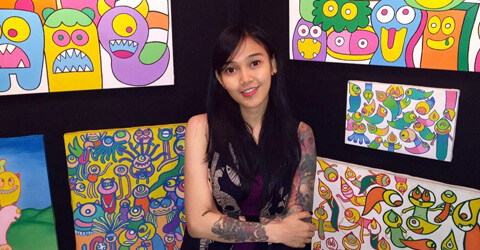Hana Alfikih is a famous artist battling Bipolar Disorder that turned to art as therapy to soothe her nerves. Her illustrations highlight various characters named after medications and mental illness, such as Medico, Skizo and Bipo, designed to amuse and raise awareness. Hana says her mission is to reduce the stigma around mental health in Indonesia.
Hana Alfikih, who goes by the moniker ‘Hana Madness’ because of her obsession with the UK Ska band Madness, grew up in a traditional and relatively conservative family in Jakarta, Indonesia. As a kid, she was bullied at school, and her life at home was equally challenging. She knew she was ‘different’ but did not know what set her apart from the others. She frequently fought with her parents, who did not understand what caused her to act out. During her high school years, she found that art can be cathartic and helped her maintain sanity amidst a psychological crisis.
Through various sketches and doodles, she articulated her complex emotions. “Most of my work then was black and white, and grey,” Hana says. “It reflected the struggles I was going through at the time”, the artist added, sharing that her sketch pad has become her place of solace- the one thing she could pour herself into.
When Hana was older and studying at the university level, she was diagnosed with Bipolar Disorder. The years that followed the diagnosis were difficult as she dealt with her dwindling mental health issues along with the adverse reactions of her family, who failed to understand or support her.
In 2012 Hana took her first step in voicing the mental health issues across various media sites in Indonesia. Relying on her personal experiences, she started using her art to increase public awareness of mental health problems. She began expressing her own mental health conditions and the range of complex emotions through her art to facilitate understanding from a larger audience.
With every brushstroke, Hana kept breaking down the unbearable stigmas attached to mental health concerns and attacked the discrimination that often accompanied the diagnosis of a mental health disorder. She didn’t realise it at the time, but her quest to normalise the conversation around mental health disorders also catalysed her own healing process. Her art and her vision soon took her to international territories in 2016 when she was invited to be a part of the British Council programme that focussed on leveraging art to initiate conversations on disabilities with the goal of creating awareness among a larger audience.
The following year, she collaborated with James, known as ‘the vacuum cleaner’ in a video project titled ‘In Chains’. She travelled to London to meet James, who, like her, had a spate of mental health problems, and began the project where she met with those who have battled mental health issues along with artists and art practitioners to further the cause.
The film, In Chains, focused on Istana KSJ (or informally known as The Palace), a radical and autonomous mental health community that is rebuilding lives in West Java located in Indonesia. Many of those living at KSJ had previously been subjected to a practice of shackling, chaining or confinement (known as Pasung) because of their disability, some for even decades. The film portrays the community and its residents and how it works to humanise those who have been denied their humanity. This video raised awareness about the barbaric practice and helped start the conversation about mental health locally and internationally. The team has also held several workshops worldwide, helping people identify mental health issues and offered them support and guidance in their journey to wellness.
With the project now showcased online, Hana has come a long way in her journey, especially through the creative arts.
“Even though I am still struggling, through art and the appreciation of it, I feel more in tune with myself mentally and physically. I am more self-aware and appreciate myself no longer fighting the natural rhythm of my life,” said Hana.
Her works have led her to be listed as one of the ‘Top 10 Most Shining Young Indonesian Artists’ in 2017, as ‘1 of 90 Young Indonesians with Inspiring Works and Thoughts’ in 2018, and as a ‘Millennial Hero for Arts and Culture’ in 2019. Her World Magazine named her in the list of ’10 Women of the Year’ in 2019. She was also named ‘1 of 11 Inspiring Figures’ by Tatler Asia.
In conclusion, she says, “I have billions of emotional turmoils that I can never understand until now. The artworks that I have made are interpretations of my mental condition and they describe every conflict inside me that I turn into something beautiful and colorful.” With a combination of art and therapy, Hana believes that she has found peace.







